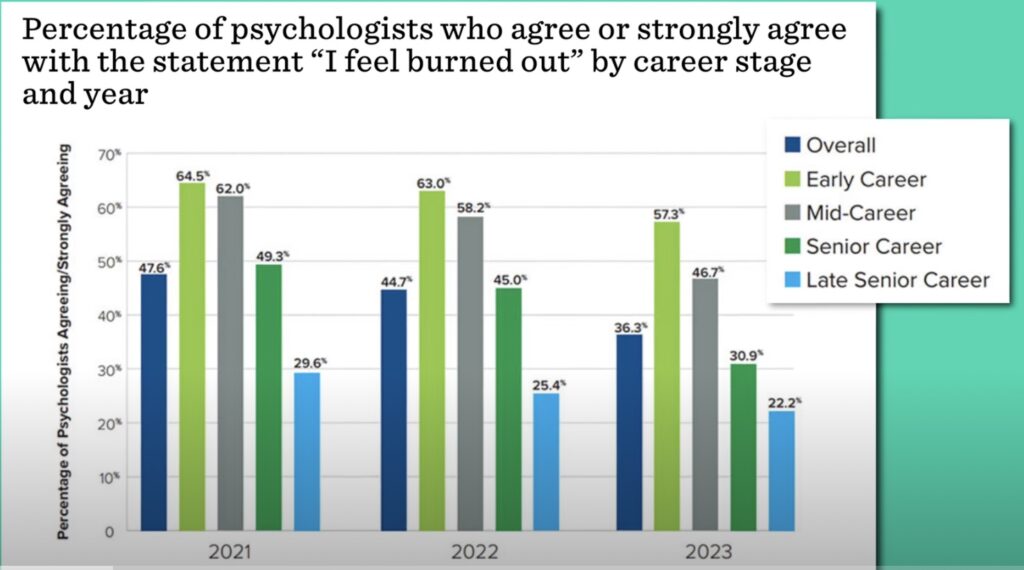Therapist burnout continues to be a prevalent issue. Since it’s still an issue, I’m going to keep talking about it!
Prefer to watch instead? Check out the video version of this article below:
How widespread is burnout?
The thing that bumped this topic onto my radar again was the April/May 2024 issue of Monitor On Psychology. They have an article titled, “When are psychologists most at risk of burnout?”
What stood out to me most, as I read the article, was that burnout seems pretty high across the board for everybody. The real takeaway is that: all psychologists are really prone to burnout. These numbers are alarming!

Does stage of career affect burnout?
The article states: “Similarly, earlier career psychologists were consistently more likely to report they felt burned out than psychologists in later career stages. Although rates of burnout are slowly falling, each year of the survey more than one third of psychologists still reported feeling burned out.” (Page, et al., 2024)
They also go onto say, “Early and midcareer psychologists consistently reported higher levels of stress than senior and late senior career psychologists, according to annual APA practitioner surveys conducted in 2021 through 2023.1,2 In fact, psychologists’ average self-reported stress levels decreased as psychologists’ careers advanced.” (Page, et al., 2024)
The article authors define the different stages of a psychologist’s career:
- “‘Early career’ is defined as psychologists with 10 or fewer years of professional experience since earning their doctorate;
- “midcareer” is defined as psychologists with 11 to 20 years of professional experience since earning their doctorate;
- “late career” is defined as psychologists with 21 to 30 years of professional experience since earning their doctorate;
- and “late senior career” is defined as psychologists with 31 or more years of professional experience since earning their doctorate.” (Page, et al., 2024)
This really stands out to me. As someone who has had my doctorate degree for 12 years, I feel like my experience in the first 2-3 years was way more stressful than it was 5-7 years out.
I’d be very curious to see the stage categories broken down even more. For example, could early career be broken down into subdivisions of 1-3 years post doctorate, and 4-6, and 7-10? Also, I’d be curious how these stress levels compare to folks who are still in graduate school.
Survey data on burnout
All of that prefacing in place, they also looked at psychologists’ average self-reported stress levels by career stage and year.

Psychologists reported their stress levels on a scale from 1 to 10.
If you pay attention to the early career folks, the average reported stress level in 2021 was 6.5, and it was the same number in 2023.
The late senior career folks reported that their average stress level in 2021 was 5.4 and in 2023 it was almost identical at 5.3.
There was a much greater discrepancy across the career span for psychologists who responded that they either agree or strongly agree with the statement: “I feel burned out.”

The highest level of agreed/strongly agreed came from the psychologists in their early career.
In comparison, only 29.6% of late senior career psychologists in 2021 agreed with the “I feel burned out” statement. And only 22.2% agreed/strongly agreed in 2023.
That’s a massive discrepancy! More than double the number of psychologists in their first ten years of their career say they feel burned out compared to those who are working 31+ years post doctorate.
What’s the definition of burnout?
All that said, that’s all the information this article gives us. Naturally, this took me on a rabbit trail. I wanted to know what data we have about therapists burnout.
According to the APA Dictionary of Psychology “burnout” is defined as: “physical, emotional, or mental exhaustion accompanied by decreased motivation, lowered performance, and negative attitudes toward oneself and others. It results from performing at a high level until stress and tension, especially from extreme and prolonged physical or mental exertion or an overburdening workload, take their toll.”
Absolutely terrifying.
Confirmation data
In my investigating I found a systematic review published in Frontiers of Psychology in 2022 that had quite a bit of information.
It was titled: “Burnout and Psychological Wellbeing Among Psychotherapists: A Systematic Review”. This systematic review confirmed the claim from the Monitor In Psychology article by saying, “Younger psychotherapists tend to report increased levels of burnout symptoms in comparison to older and more experienced colleagues in that profession” (Van Hoy, Rzeszutek, 2022).
I’m not really sure how they determine this practically when conducting the research. But, they go on to offer an explanation for why this difference occurs.
A reason for early career burnout
The authors of the systematic review say, “In our specific context, this is explained by the fact that young psychotherapists often have excessively high and unrealistic expectations about their role in this job, and the subsequent reality crash may be a significant burnout catalyst for them” (Van Hoy, Rzeszutek, 2022)

I really appreciated this section of the article. I hadn’t heard anyone present this perspective before. But, it makes sense to me! It fits my experience.
If it really is true that folks earlier in their career are more prone to burnout and that is a direct result of having way too high expectations of themselves as therapists, then that feels like something we can problem solve!
Can we interact with each other in a way that brings all of us back to planet earth as far as what realistic expectations look like given where we are in our career? We should be able to trust that we’re still learning and that we can keep growing and accessing information.
And, that there will never be a day when we will know all the things. We can’t know all the things! Because we’re humans!
Some burnout predictors
Some other important things that they covered in this systematic review included saying,“…traits related to negative emotionality (e.g., neuroticism, emotional reactivity) were burnout predictors, while those associated with emotional stability and high levels of subjectively perceived resources (e.g., resilience) were buffers against this syndrome in this occupation.” (Van Hoy, Rzeszutek, 2022)
The authors went on to say, “Similarly, emotion-oriented coping was positively correlated, while problem-focused coping or the use of humor to deal with work-related stress were negatively linked to burnout symptoms in this occupation.” (Van Hoy, Rzeszutek, 2022)
There are parts of these quotes that would be considered common sense. For example, if you believe you have more coping resources you are less prone to burnout.
Emotion-oriented coping
But, I’m curious! The authors talk about emotion-oriented coping as being correlated with therapist burnout. I was very curious to find out what emotion-oriented coping is.
After a quick google search I learned from the NIH that, “Emotion-oriented coping is defined as individual’s efforts at reducing stress through emotional responses, including emotion expression, blaming others, self-blame, emotion containment and passive resignation (Endler & Parker, 1994).
That explanation definitely clarifies it! It sounds like there is a takeaway we might be able to extrapolate here.
We could conclude that if you’re finding any signs of burnout popping up for you, don’t minimize it or over-inflate it with overly emotional responses. Rather, it may be helpful to name reality for what it is, see if there is anything you can do to help problem solve, and access as many resources as you have on the topic.
More burnout associations
There were a couple more takeaways that came from this systematic review.
The systematic review says, “Six studies have revealed significant associations between high workload and increased levels of burnout” (Van Hoy, Rzeszutek, 2022)
I think we have “Captain Obvious” to thank for that one! But, it’s still helpful to see that conclusion supported in the data.
Also, Van Hoy and Rzeszutek stated: “Additionally, working in the public sector seemed to be positively associated with burnout levels.” (2022)
They go on to say, “This finding was usually explained by a lack of control over their own work environment among psychotherapists and an increased level of bureaucracy in such workplaces compared to private psychotherapists’ offices, where they may feel that they have more control over when, where, and how they will be working with their clients.” (Van Hoy, Rzeszutek, 2022)
Thank goodness, they include a moment of hope: “Lastly, personal therapy and/or supervision act as a buffer against burnout, as mentioned by five authors.”
Solutions to burnout?
I know that most of this blog post is just me sharing some of the information that is out there, and sprinkling in my own commentary. I’m aware that I don’t have the direct solution for how to solve all therapist burnout!
But, if you are feeling stressed or burned out in your workplace, I hope you feel seen and validated. Unfortunately, what you are going through is normal. The way that we’ve set up our career is setting folks up for burnout and stress.
Opportunity for checking expectations
But, I do think this is a good opportunity for each of us to check in with ourselves and see what our personal career expectations are. Particularly, if you are earlier on in your career process.
See if there’re appropriate spaces for you to reality-check your expectations of yourself. You could have these conversations with a supervisor, a consult group, or your personal therapist.
The point is not to degrade all the skills you bring forth, because you do already have SO many (!), but rather to bring yourself back to a healthy, appropriate reality. You should be able to say: “I am right where I’m supposed to be right now. If I need help with something, I can ask for help.” This doesn’t mean you are falling short somehow!
That feels like a very helpful narrative shift that we all can work on together!
Are you happy and satisfied as a therapist?
Often those who are burned out are unhappy in their career. Is that you? Check out the video with a little triage checklist of sorts to help correct course.
Do you think therapists would choose this same career if they could start over? Even with all the high rates of burnout? I explore this question in an article titled: Are therapists are satisfied with their careers?
And until next time, from one therapist to another: I wish you well!
-MariePhoto by Fritz Jaspers on Pexels
Photo by Andrea Piacquadio on Pexels
Leave A Reply